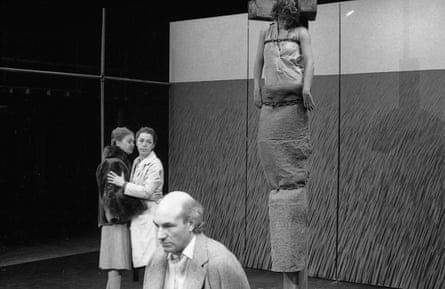Edward Bond: ‘Our theatre trivialises or generalises – both are forms of sleaze’
When Shakespeare’s Lear is mad he wanders on a heath and proclaims a philosophy of utter sanity. If we lived by it there would be no war, poverty or cruelty. At Stratford there was a heath in which Shakespeare owned valuable financial rights. On part of the heath poor squatters had settled, according to a time-honoured custom.
Some landowners wanted to enclose the heath. It was an early form of privatisation which meant the poor would be driven off and made dependent on local income support. To control the unrest this caused, the law made poverty a crime. Beggars were flogged and hanged.
The enclosers gave Shakespeare a document guaranteeing him against financial loss. He did nothing to protect the poor. We would know if he had. Lear would have crucified Christ twice for allowing such things to happen. Shakespeare’s silence is a Brechtian Lehrstück.
Tragedy discovers truth. Great tragedy is the cry of “Eureka!” uttered in pain. So Shakespeare the property owner was in fatal conflict with the dramatist of Lear. They disagreed on the meaning of morality and even of sanity. The ex-chancellor Nigel Lawson said Shakespeare was a Tory. Shakespeare the dramatist is often sweepingly radical. But as a man he was frightened and grasping. It was as a man that he was a Tory.
I wrote Bingo in 1972 because I felt this conflict in Shakespeare was the beginning of the present conflict in our society. Since I wrote it the conflict between capitalism and conservatism has deepened. Capitalism depends on constant technological innovation. This turns the world upside down and people inside out. But conservatism needs all things to stay the same. That is why it has to return to the values and behaviour of the past.

In Bingo I credit Shakespeare with self-knowledge, which means he did his own suffering. In my play he kills himself. Our leaders have no self-knowledge and so we will suffer for them. When society is torn by a conflict it does not understand it turns to violence to resolve it. This is the situation of western democracy. It is a purpose of Bingo, of all my plays, to show that it is a culture of death.
The present Jacobean drama in the Conservative party is part of this conflict. The increasing barbarism of the US and Europe is frightening. Our democracy is haunted by the shadow of fascism.
Democracy is not just freedom of thought. It is freedom of imagination. That cannot be created by law. Yet without it there is no freedom of thought. We have hardly begun to understand this. The imagination dramatises the world. In the past it was controlled by religion and “high” art. They repressed it at the cost of a little freedom. But in our changing, insecure world it must be controlled in new ways. Consumer democracy would be impossible without TV and the other media. They constantly agitate and bewilder the imagination, brutalising everything.
When the Greeks created the first western democracy they also created western drama. Democracy and theatre always go together. When one is corrupt the other is corrupt. The imperative of Greek drama was: know yourself. Ours is: do not! TV, press, pop culture – all exist to make money, not to seek truth. They serve the culture of death by creating a sham life.

Drama deals with society and the individual. It enters the hidden places of the self, and the imagination has to respond. Like pierced skin, it becomes whole again or dies.
But our theatre trivialises or generalises, and both are forms of sleaze. It still vaguely knows what a Shakespeare play is, but not why it – or any play – is written. And so it does not know how it should now be acted. Classics have no answers, instead they define and make inescapable the problems all generations must solve in order to be human. But we stage a generalisation and cling to the old answers like a drowning man pretending he is a ship.
A little while ago the RSC’s voice coach Cicely Berry and I held some workshops for actors. We showed them why and how a text was written, how all Shakespeare’s texts are tormented – the Tempest as much as any – and we tasked them with his desperation. Their acting was unforgettable. Yet every night they returned to the same RSC production. The same bland generalisation whatever the play.
At the National Theatre it is worse – it has become destructive. The Royal Court still has a chance. Recently it has staged at least one major play, Blasted. But the production was not as good as the play. I cannot blame the director and cast of this or any other production. There are complex reasons for the theatre’s corruption. But the effect is this: directors no longer know – dare not know – what a play is. They hide their ignorance and fear behind music, costumes, lights and noise.
At the moment, writers provide a takeaway service for directors. In TV and film this relationship is now institutionalised because, under the pressure of accountants, real innovation comes only from machines. This won’t do in theatre because of the primacy of the living actor. We waste the younger writers who could write in new ways that would destroy the generalisations and even recreate the classics.
The director of the National Theatre [Richard Eyre] is leaving. I think one of its theatres – the Cottesloe – should be given into the care of a group of writers, to choose the plays, direct them or choose the directors, and with the actors create the new way of acting we urgently need. The critics would attack it. But a new theatre would find its audience because our democracy waits for it.